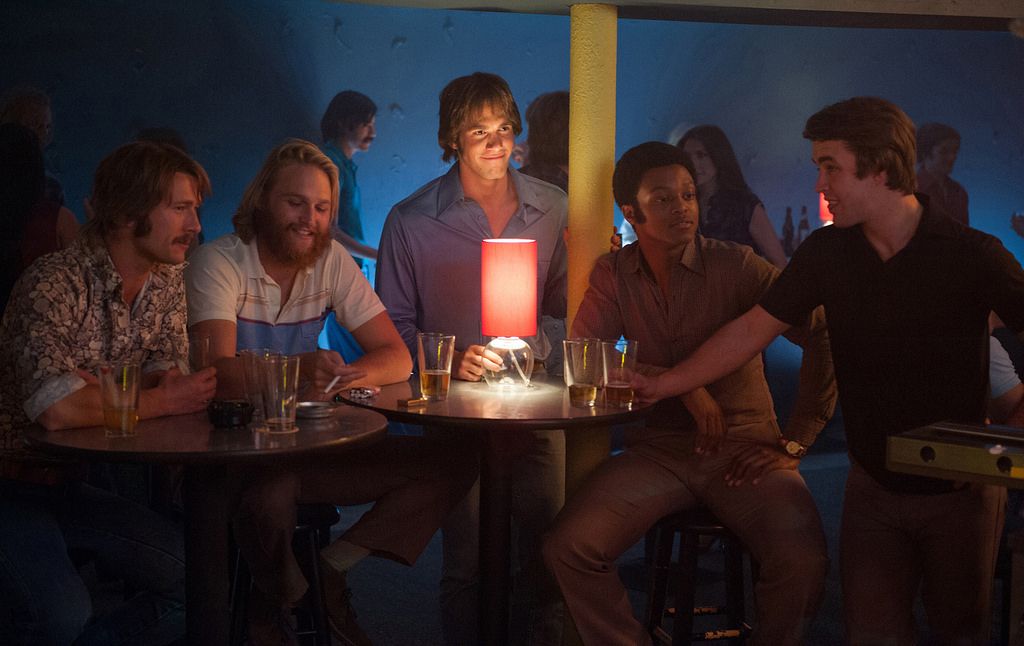“Everybody Wants Some!!” Excites With Brisk Pace, Realistic Period-Detail

Richard Linklater’s “Everybody Wants Some!!” is about a group of college athlete bros attending six parties over the course of three days before classes begin. It is as if the high school students in Linklater’s comedy gold “Dazed and Confused” are now in college, and is probably the best movie I’ve seen in 2016 so far.
This statement probably does not appear to mesh well with the synopsis given above. But this movie is only ostensibly about men clowning around. After all, this is the director of the acclaimed “Boyhood.” Maybe it is satire in the vein of Martin Scorsese, one that while exploring the nooks and crannies of a particular lifestyle, fiercely indicts its excesses. That’s the expectation I had while purchasing my popcorn: a condemnation of 80s bro culture. But thankfully, that is not what I got. “Everybody Wants Some!!” deliberately refuses to be more than meets the eye. That is what makes the film so uniquely powerful.
Just as this film’s spiritual prequel “Dazed and Confused” expertly surveyed the 70s from the eyes of a high school student, “Everybody Wants Some!!” does the same for the 80s, from the vantage point of a college baseball player. Each of the six parties the athletes attend constitute the panorama of the multiple cultures sizzling and boiling over at the time. Linklater briskly prances across each, allotting just enough time for each to shine. In one moment, the main character is trying desperately to get laid at the disco; a few scenes later, one of his buddies’ machismo shenanigans embroil the company in a brawl that subsequently bans them from the establishment. Not to be deterred, our bros dress up like cowboys and throw themselves into a faux-rodeo to cap the night.
This brisk pace, along with the endless, wordless procession of period-detail (corded telephones, Ronald Reagan, frizzy hair, Van Halen, etc.) are the defining features of the film, and the key to what makes the movie work. No scene ever dwells too long as to even pass as ponderous. There is no heavy-handed, ham-fisted moralizing. When the athletes sit down in their dorm commons to take a break from their ceaseless partying, they’re not contemplating the lightweight banality of their existence — they are trying to get high. This is not to say that the film is entirely mindless. One of the athletes off-handedly comments (while extremely high) that the dorm is crowded by obsessively competitive, insecure musclemen. We see this in many other scenes, particularly in a knuckle-flicking contest, where two athletes end up with bloody fists while trying to out-man the other. But when the film does put its mind to something, it is intentionally distracted by something else, some other party, some other superficial buzz and gleam. And by doing so, it celebrates the figure of the “dudebro”.
An important caveat is that the film does not prop up any outdated ideals of masculinity as something to be idolized. Linklater, as he has shown in “Boyhood,” is a sucker for nostalgia, not machismo. While the movie is undeniably saturated with markers of machismo, it finds it not admirable but funny. It invites the audience to laugh at (in many cases along with the characters) when the pitcher throws a raging fit after his self-proclaimed 95 miles per second fastball is countered by a homerun during scrimmage, and when the main character, so well practiced in the art of swagger, is reduced to a bumbling, mumbling mess when he encounters a woman with whom he actually wants to cultivate a lasting relationship. But amidst the laughter, there is a kind of solidarity, a nudge-wink indulgence in the passing passions of life.
In that vein, the title of the movie is perfect. Everybody indeed wants some, and the film chronicles the small and funny failures along the way. The conclusion may throw a sizeable portion of the audience off as it suddenly lowers the volume of life’s music and offers a quietly disquieting moment of contemplation that name-drops Albert Camus and the Myth of Sisyphus as to philosophically frame the intent of the movie. It’s an interesting and well-directed scene, but it is rather unsubtle and off-putting, especially considering the films tone up to this point. But it is a flaw that is in no way sufficient to capsize the ship, especially when the ship is already sinking and the unmindful sailors are playing water polo to some 80s rock and roll. It is a movie that implores the viewer to experience and think for oneself but can unfortunately be discussed only in ambiguities. To be sure, it is the 80s throwback that speaks tremendous truth without being at all coherent to watch in the 21st century.





Comments ()